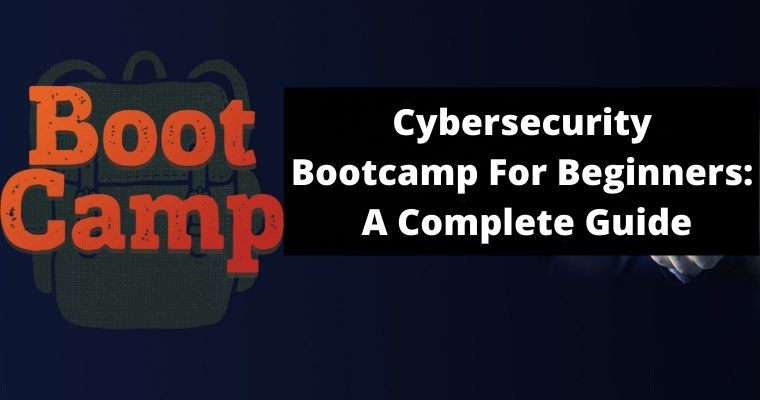The world of cybersecurity is complicated. New cybersecurity technologies are being developed every day, and they all need to be understood in order for an organization to defend itself.
It can be easy to miss some information or think that because you’ve done your research on one topic it means you know everything about another.
That’s why Cybersecurity Bootcamps are so popular nowadays, as they make it possible for organizations to get their entire staff trained in the latest methods of defending their company’s networks in a fraction of the time and cost.
Springboard’s Cybersecurity Bootcamp is the best for beginners since they back the program with a job guarantee scheme. *Get a job or you will receive a full refund.
Table of Contents
What is Cybersecurity Bootcamp?
Cybersecurity bootcamp is an immersive training program that is designed to help students find a job in the cybersecurity field quickly.
There are many different types of cyber security bootcamps, but most will include training on penetration testing, ethical hacking, computer forensics and other core skills.
Some cybersecurity bootcamps will even include training on specific software such as Kali Linux, Burp Suite, or Metasploit.
Cybersecurity bootcamps for beginners are designed to give students the skills they need to land a job in the cybersecurity field as quickly as possible.
It is also designed to give students the skills they need to make a difference in the world of cyber security during their first year on the job. Many of these bootcamps will even help you find an internship while you are taking the course.
Cybersecurity Bootcamp for Beginners
There are several ways to enter the cybersecurity industry, but one of the best ways is by enrolling in a cybersecurity bootcamp for beginners.
These bootcamps are designed to accommodate participants with minimal prior cybersecurity knowledge. The instructors leading these cybersecurity bootcamps are seasoned experts who bring a wealth of industry experience to the table.
They guide beginners by offering a holistic overview of key concepts and practices while providing invaluable insights into the latest threats and best practices.
One of the most appealing aspects of a cybersecurity bootcamp for beginners is its time efficiency.
Traditional education paths can take years, whereas bootcamps condense learning into a matter of weeks or a few months, enabling individuals to enter the workforce much sooner.
These courses are created to provide you with the knowledge and abilities you need to succeed, and they may be finished quickly so you can begin your career as soon as feasible.
A cybersecurity bootcamp for beginners serves as a crucial stepping stone for individuals aiming to break into the dynamic and rewarding field of cybersecurity.
How Can Beginners Get Started with Cybersecurity Bootcamp?
It’s time to launch your career after determining that this is a field you want to learn more about. Through one of the various cybersecurity bootcamps for beginners, you may start your career in cybersecurity off on the right foot.
7 Important points on how beginners can effectively get started with a cybersecurity bootcamp are given below.
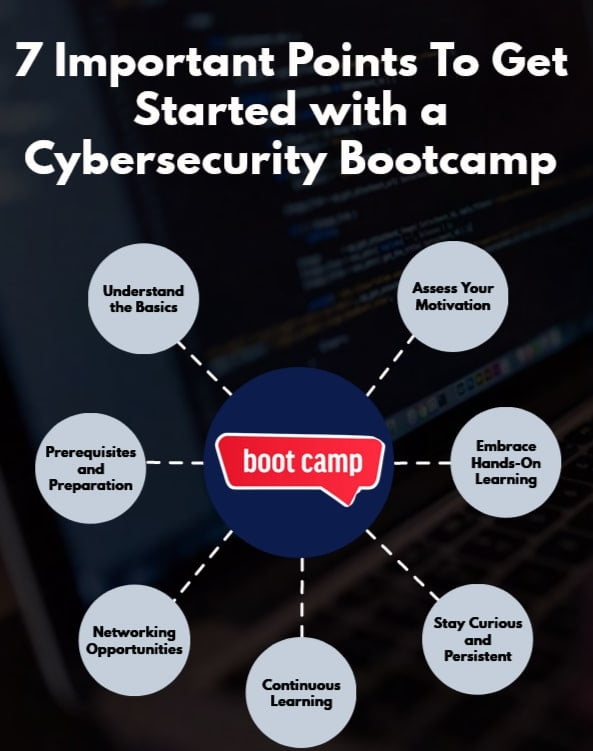
Understand the Basics
- From understanding the fundamental principles, these programs provide training in a wide range of topics, covering ethical hacking, network security, cryptography, digital forensics, exploring threat detection and risk management.
- This baseline knowledge will help you make the most of the bootcamp curriculum.
Assess Your Motivation
- Cybersecurity requires dedication and a passion for problem-solving. Reflect on your motivation for entering the field.
- Identifying your interests will guide your bootcamp selection and learning path.
Prerequisites and Preparation
- Many cybersecurity bootcamps for beginners have prerequisites, which could include basic programming skills, networking knowledge, or prior IT experience.
- If you lack these skills, consider taking online courses or tutorials to bridge the gap before starting the bootcamp.
Embrace Hands-On Learning
- Cybersecurity is a practical field that demands hands-on experience.
- Bootcamps often simulate real-world scenarios, allowing you to practice identifying vulnerabilities, conducting penetration tests, and implementing security measures.
- Engaging in these activities will solidify your understanding of concepts.
Networking Opportunities
- While enrolled in the training program, participants will have the opportunity to network with professionals in the field and gain first-hand work experience with a multifaceted understanding of the cybersecurity landscape.
- Building a network within the cybersecurity community can provide insights, advice, and potential job opportunities.
Stay Curious and Persistent
- Stay curious about new threats, tools, and techniques by following industry news, blogs, and forums.
- Persistence is key, as you will encounter challenges that require determination to overcome.
Continuous Learning
- Regularly update your skills and knowledge to adapt to new challenges and technologies.
- Attend webinars, conferences, and workshops to stay at the forefront of the field.
How to Choose the Best Bootcamp for Cybersecurity?
The key factors to consider when selecting the best cybersecurity bootcamp are to ensure you receive the education and training necessary to excel in this dynamic field.
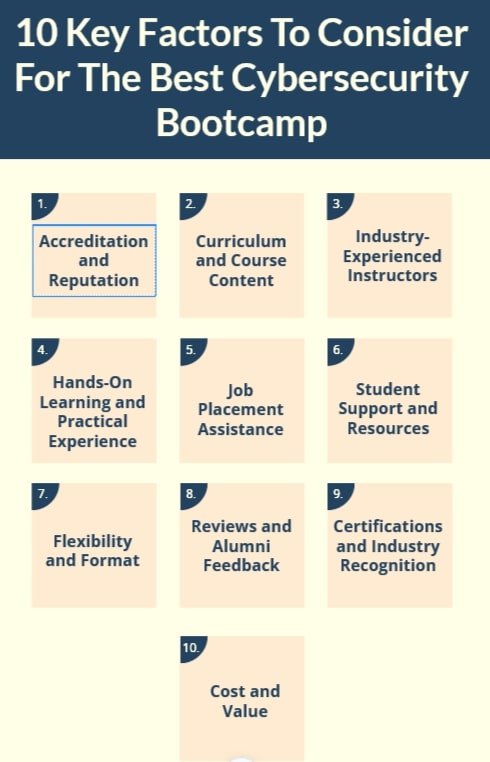
Accreditation and Reputation
- Begin your search by assessing the accreditation and reputation of the bootcamp. Look for bootcamps that are recognized by relevant industry bodies or institutions.
- A reputable bootcamp often has partnerships with well-established organizations, which can enhance your job prospects upon completion.
Curriculum and Course Content
- Review the curriculum and course content of the bootcamp. A strong cybersecurity bootcamp should cover a wide range of topics, including network security, cryptography, ethical hacking, incident response, and more.
- Ensure that the curriculum aligns with the skills and knowledge needed for various roles within the cybersecurity domain.
Industry-Experienced Instructors
- Instructors play a pivotal role in the quality of education you receive. Research the instructors’ backgrounds and experience within the cybersecurity industry.
- Look for bootcamps that employ instructors with real-world experience and a strong track record in the field.
Hands-On Learning and Practical Experience
- Cybersecurity is a hands-on field that demands practical skills. Look for bootcamps that offer hands-on labs, simulations, and real-world projects.
- Practical experience is essential for gaining confidence in applying theoretical concepts to actual scenarios.
Job Placement Assistance
- One of the primary goals of enrolling in a bootcamp is to launch a successful career. Evaluate the boot camp’s job placement assistance offerings.
- Make sure the bootcamp offers more than just cybersecurity training; they need to offer internships and job placement as well.
- A good bootcamp should provide career services such as resume building, interview preparation, and networking opportunities to help you secure a job after completion.
Student Support and Resources
- Consider the level of student support and resources provided by the bootcamp. Are there mentors available to guide you?
- Does the bootcamp offer access to a community forum where you can interact with peers?
- Robust support systems contribute to a more enriching learning experience.
Flexibility and Format
- Choose a bootcamp that fits your lifestyle and learning preferences. Some bootcamps offer full-time immersive programs, while others provide part-time or online options.
- Assess your availability and learning style to find the format that suits you best.
- You should also have the option to choose from a wide variety of course lengths, including multiple options for both onsite and online programs.
Reviews and Alumni Feedback
- Research reviews and feedback from alumni of the bootcamp. Online platforms, social media, and forums can provide insights into the experiences of former students.
- Alumni success stories can also give you an idea of the potential outcomes of the bootcamp.
- Only work with institutes that have a proven track record of success. They should have testimonials and reviews from past students as well.
First Certifications and Industry Recognition
- Look for bootcamps that offer the opportunity to earn recognized certifications in cybersecurity.
- Consider pursuing industry-recognized cybersecurity certifications such as CompTIA Security+, Certified Information Systems Security Professional (CISSP), or Certified Ethical Hacker (CEH) to enhance your credentials.
Cost and Value
- While cost is a significant factor, prioritize value over the price tag. Compare the cost of the bootcamp with the quality of education, resources, and career prospects it offers.
- Remember that a well-regarded, comprehensive bootcamp may provide a higher return on investment in the long run.
Selecting the best cybersecurity bootcamp is a decision that can shape your future in the field of cybersecurity.
By considering the above points, you can make an informed choice that aligns with your career aspirations and sets you on a path to success in this field.
List of Top 5 Best Cybersecurity Bootcamps for Beginners in 2025
There are some best cybersecurity bootcamps for beginners where they get trained by experts.
| Rank | Academy | Job Guarantee | Bootcamp |
|---|---|---|---|
| #1 |  | 100%
| Visit Springboard |
| #2 |  |
| Visit Flatiron School |
| #3 |  |
| Visit Coding Dojo |
| #4 |  |
| Visit Fullstack Academy |
| #5 |  |
| Visit Eleven Fifty Academy |
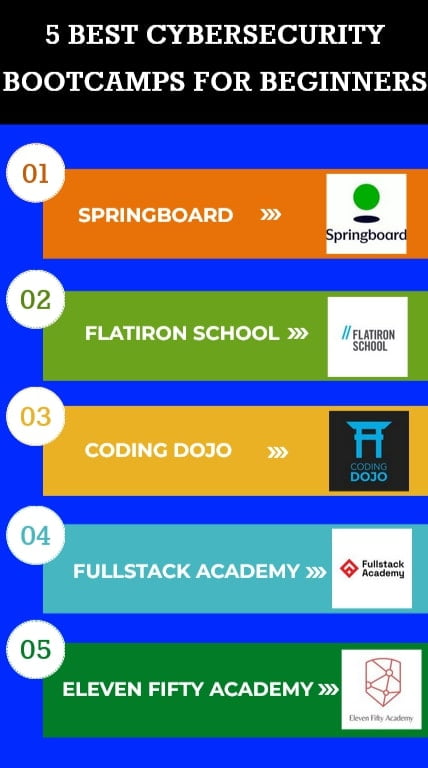
5 Best Cybersecurity Bootcamps for Beginners (Detailed Review)
1. Springboard’s Cybersecurity Online Bootcamp: Empowering Future Cyber Defenders
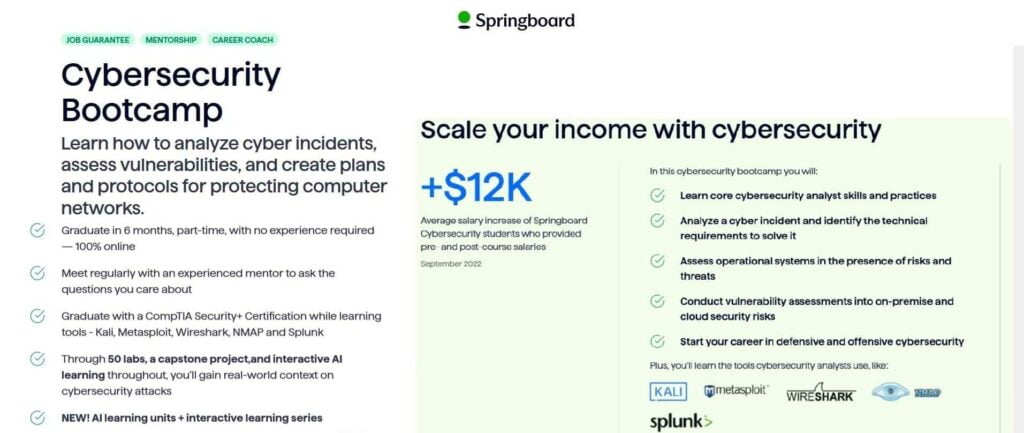
Springboard’s Cybersecurity Online Bootcamp stands as a beacon of hope in this cyber battleground, offering an immersive and comprehensive educational experience.
Requirements
Pass an evaluation of baseline soft skills, centered around communication, motivation, professionalism, analytical mindset, and commitment to learning.
Springboard Job Guarantee Bootcamp Eligibility Criteria
- Bachelor’s Degree or 1 year of relevant work experience or 1 year of relevant military experience.
- Successful completion of all mandatory coursework, core projects, the CompTIA Security+ certification exam and career development tasks.
- Fulfill all post-completion job search requirements — regular networking, job applications and interviewing.
One of the most compelling aspects of Springboard’s Cybersecurity Online Bootcamp is its accessibility. In a world where time and location constraints often hinder educational pursuits, this program offers a flexible and remote learning environment.
Students can engage with the curriculum from anywhere in the world, making it an ideal choice for professionals looking to upskill or switch careers.
This accessibility is further enhanced by the program’s self-paced nature, allowing individuals to tailor their learning experience to their specific needs and commitments.
The curriculum itself is a testament to Springboard’s commitment to producing cybersecurity experts who are well-prepared to tackle real-world challenges.
In this curriculum will will learn about
- Core cybersecurity analyst skills and practices
- Analyzing a cyber incident and identifying the technical requirements to solve it.
- Assessing operational systems in the presence of risks and threats.
- Conducting vulnerability assessments into on-premise and cloud security risks.
- Graduate with a CompTIA Security+ Certification.
New Update: In addition to the existing topics, AI learning units have been added to the cybersecurity curriculum in September 2023, which includes the following
- Workshops covering Artificial Intelleigence subjects such as prompt engineering.
- You get exclusive live lectures and Ask Me Anything (AMA) sessions featuring industry experts.
- Enhance your AI collaboration skills through our short duration courses.
- Connect with peer communities focused specifically on AI.
What sets Springboard apart is its focus on hands-on learning, with students actively engaging in practical exercises and projects that simulate real cyber threats and defenses.
This experiential learning approach ensures that graduates are not just well-versed in theory but also have the practical skills to excel in their roles.
Another standout feature of the Springboard Cybersecurity Bootcamp is its 1-on-1 mentorship program. Each student is paired with an industry expert who provides personalized guidance and support throughout the program.
This mentorship not only offers valuable insights into the cybersecurity field but also helps students build a professional network that can be instrumental in their future careers.
From resume building to interview preparation, the program provides comprehensive career services that help students secure rewarding positions in the cybersecurity field.
Its accessibility, hands-on learning approach, mentorship program, and robust career support make it a top choice for individuals looking to forge a path in this high-demand field.
Furthermore, Springboard’s strong emphasis on career support ensures that graduates are recruited to top global organizations within 6 months of completing the course or you will get a full refund of your bootcamp fee.
As the digital landscape continues to evolve, Springboard’s commitment to producing knowledgeable and skilled cyber defenders is a testament to its dedication to shaping the future of cybersecurity.
For those seeking to join the ranks of defensive and offensive cybersecurity, Springboard’s Cybersecurity Bootcamp is a compelling and empowering choice.
Program Fee – $9,900 and they offer another 3 flexible payment options with installments.
Also Read: Most Secure Web Hosting Service Providers
2. Flatiron School Cybersecurity Bootcamp (In-Person/Online)

The Flatiron School Cybersecurity Online Bootcamp is a cutting-edge program designed to equip individuals with the skills and knowledge needed to excel in the fast-paced world of cybersecurity.
With a duration of 15 weeks, this immersive online course is full-time. While part-time courses can be completed in 40 weeks.
One of the program’s key strengths is its comprehensive curriculum. It has a wide range of topics, including Cybersecurity Engineering Prep, Cybersecurity Foundational Skills, Cybersecurity Intermediate Skills, Cybersecurity Skills Development, Gray Hat Hacking, Cybersecurity Skills Application and Capstone Projects.
What sets the Flatiron School Cybersecurity Online Bootcamp apart is its hands-on learning approach. Students gain practical experience by working on real-world cybersecurity projects, simulating the challenges they will encounter in their careers.
This hands-on training is invaluable in developing the problem-solving skills necessary to protect organizations from cyber threats effectively.
Another standout feature of this bootcamp is its dedicated and experienced instructors. The Flatiron School takes pride in its team of industry experts who are passionate about teaching and mentoring the next generation of cybersecurity professionals.
Their guidance and support play a vital role in helping students succeed and stay up-to-date with the latest industry trends.
Flexibility is another advantage of the program. As it is offered online, students can learn at their own pace and fit their studies around their existing commitments.
In conclusion, the Flatiron School Cybersecurity Bootcamp is a comprehensive and flexible program for anyone looking to embark on a rewarding career in cybersecurity or enhance their existing skill set.
Program Fee – $16,900 with a $99 security deposit.
3. Coding Dojo Cybersecurity bootcamp (Online/Part-time)
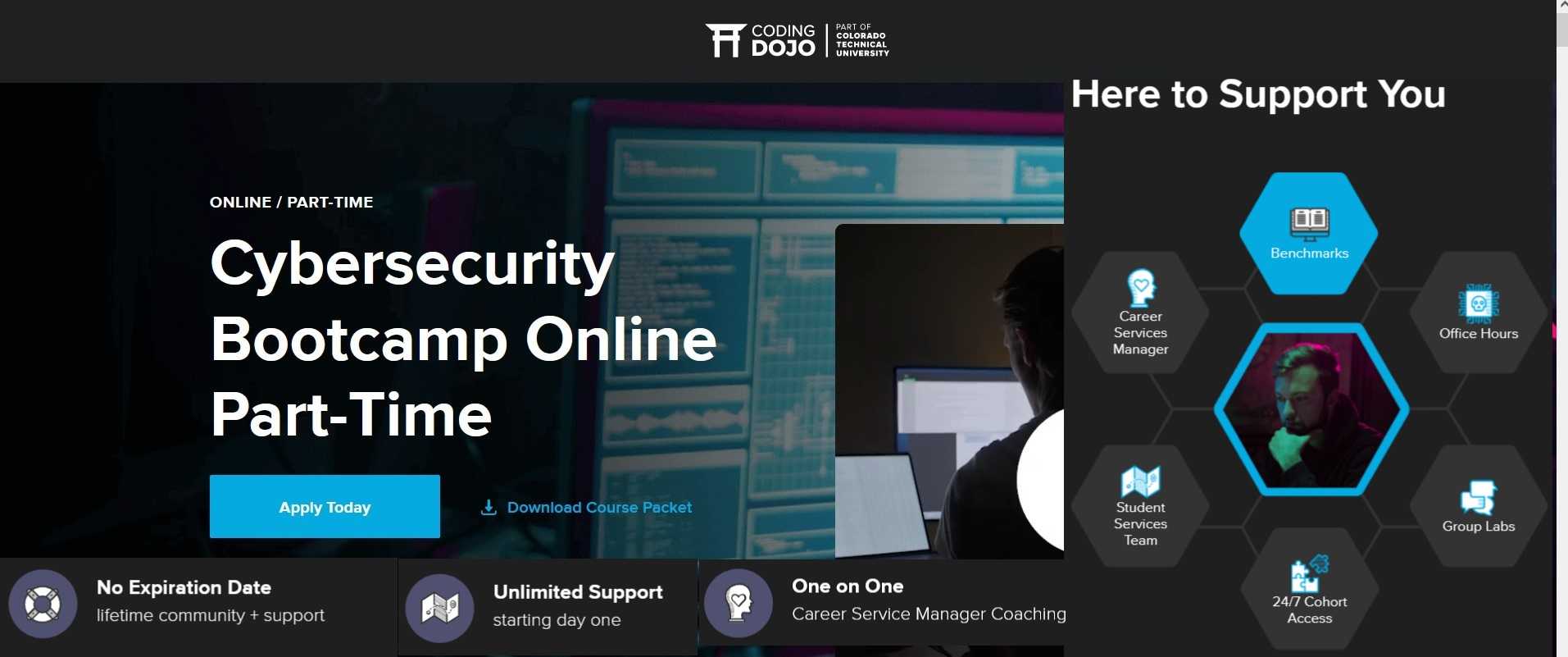
Coding Dojo’s Cybersecurity Online Bootcamp is an excellent resource for anyone interested in pursuing a career in cybersecurity.
Its flexible part-time format, comprehensive curriculum, practical approach, and strong support network make it a top choice for individuals.
Application Process
- You can schedule a Q&A call with admissions to get quick answers about the bootcamp or join the next Open House.
- Apply to the Coding Dojo Online Part-Time Cybersecurity Program.
- Meet an admission advisor to make sure you are ready for the challenges of the bootcamp. An acceptance decision will be made within 2-3 business days.
- If accepted to the program, you will be asked to deposit the fee to officially reserve your seat and gain access to bootcamp-prep materials for your start date.
Curriculum Overview
- Pre-Course (0-1 Week)
- Track 1 – Core (1-8 Weeks)
- Track 2 – Intermediate (9-16 Weeks)
- Track 3 – Professional (17-24 Weeks)
- Graduation – (24 Week)
Scholarships
- Coding Dojo is offering a scholarship program for underprivileged students under the Kickstart Fund.
- if the prospective incoming student’s income is less than $40,000 per year, then he/she will be eligible for $1000 or $1500 based on the program selected.
- A recent pay stub, W2, or bank statement must be submitted for proof of eligibility.
Dedicated Career Services
- Lifetime community + support with no expiration date.
- Unlimited Support from day one.
- One-on-one career service manager coaching.
Program Fee – $16,995 with a $99 security deposit.
4. Fullstack Academy Cybersecurity Analytics Bootcamp (Online)
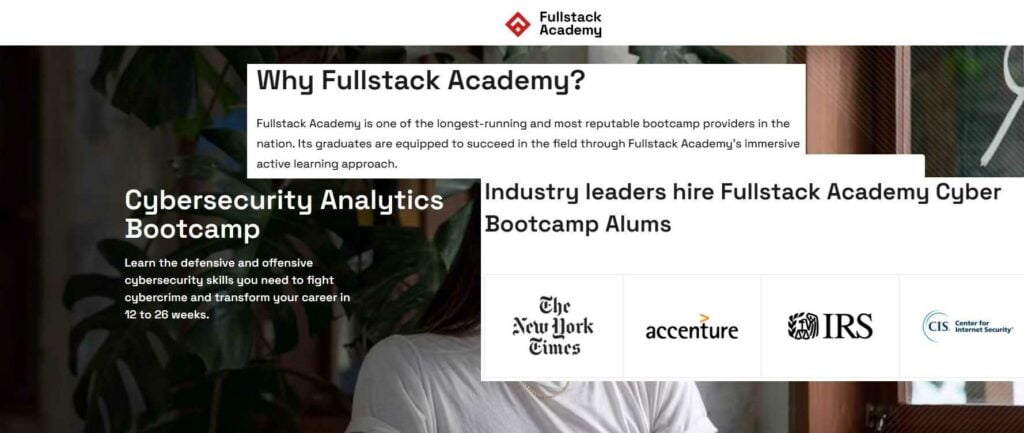
Fullstack Academy’s Cybersecurity Analytics Bootcamp is a top choice for individuals looking to launch a successful career in cybersecurity.
Application Process
- Fill out an online application which takes roughly 30–45 minutes to complete.
- A 30-minute logic-based assessment will be done.
- In the final step, you will receive the entrance decision.
The full-time program takes 12 weeks to complete while the part-time will be completed in 26 weeks.
Cyber Bootcamp Curriculum
- Cybersecurity fundamentals
- Asset and Inventory management
- Network Systems
- Programming with Python
- System Administration
- Red Team (Offence)
- Blue Team (Defense)
Program Fee – $17,980 with a $99 security deposit.
5. Eleven Fifty Academy Cybersecurity Bootcamp (Online)
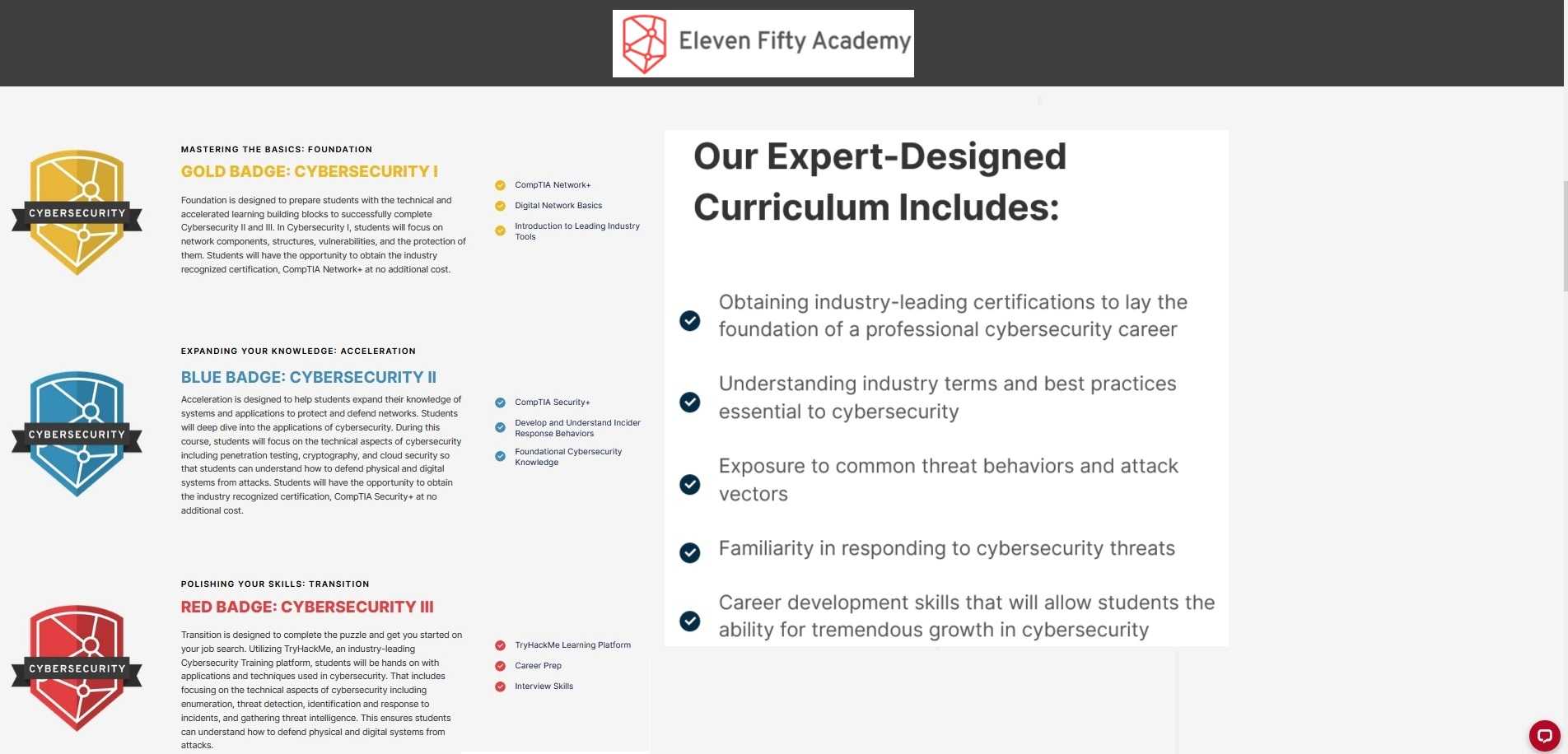
Eleven Fifty Academy’s Cybersecurity Bootcamp is a fantastic opportunity for anyone looking to break into the cybersecurity industry or enhance their existing skills.
Program Curriculum
- Gold Badge – Cybersecurity I – CompTIA Network+, Digital Network, Basics Introduction to Leading Industry Tools.
- Blue Badge – Cybersecurity II – CompTIA Security+, Develop and Understand Incident Response Behaviors, Foundational Cybersecurity Knowledge.
- Red Badge – Cybersecurity III – TryHackMe Learning Platform, Career Prep, Interview Skills.
Program Features
- 500 hours of live instruction
- Portfolio Development
- Post-Grad Atlas Program
- CompTIA Learning Tools
- Certification Testing
- 8:1 Student-to-Instructor Ratio
- 1-on-1 Instructor Time
- Group Study Sessions
- 1-on-1 Career Coaching Resume Building
- Mock Interviews
- Career Services
Program Fee – $13,500.
How Hard is Cybersecurity Bootcamp?
A cybersecurity bootcamp can vary in difficulty based on prior experience and the program’s intensity.
Generally, bootcamps are intensive and demanding, covering a wide range of sub-topics within cybersecurity. Participants should expect rigorous hands-on exercises, real-world simulations, and rapid learning.
While these cybersecurity bootcamps can be challenging due to the technical complexity of subjects, success often requires problem-solving skills, dedication and the ability to adapt to evolving threats.
Are Bootcamps Good For Cybersecurity?
Of course, Yes.
Attending a cybersecurity bootcamp has a lot of advantages. The first is the capacity to acquire the expertise required in a demanding, cutthroat industry.
You can gain access to mentors through bootcamps who can assist you in expanding your knowledge base and skill set. Students also develop relationships with their classmates, some of which may be useful later on while looking for employment.
There are other advantages to attending a cybersecurity bootcamp. They offer a comprehensive training program that will equip you with the abilities and information necessary to place you in the most advantageous prospective position when it comes to job searching.
If you don’t yet have a lot of cybersecurity experience, a bootcamp may additionally assist you in strengthening your résumé.
Is a Cybersecurity Bootcamp Worth It?
The short answer is “yes”
There are many benefits to attending a cybersecurity bootcamp. One is the ability to learn the skills necessary for an in-demand, competitive field.
Bootcamps can give you access to mentors who will help you build your knowledge and skill set. Furthermore, students forge connections with fellow classmates which may be beneficial for finding work in the future.
A cybersecurity bootcamp can be beneficial in other ways too. They provide an immersive training regiment that will give you the skills and knowledge needed to put you in the best possible position when it comes to job hunting.
A bootcamp can also help you improve your resume, which is especially helpful if you don’t have a lot of experience in cybersecurity yet.
Who Can Attend a Cybersecurity Bootcamp? Is It For Everybody?
Cybersecurity bootcamps are not for everybody. If you want to get a job in the cybersecurity field, this article will tell you who should and who shouldn’t attend a cybersecurity bootcamp.
If you have a Bachelor’s degree or higher, you should consider attending a cybersecurity bootcamp.
Cybersecurity bootcamps are specifically tailored to people with college degrees. The courses are accelerated, so if you already have some technical knowledge, you can then keep up with the curriculum.
If you don’t have a college degree, you should consider an associate’s degree program. The coursework is usually more general and not as specific to cybersecurity.
However, if you want to get into this field particularly, a college degree and some technical knowledge are what we recommend before signing up for a bootcamp!
Cybersecurity Bootcamp Scholarships
A cybersecurity bootcamp is a type of training program that teaches students to secure networks and systems.
They can vary in length from 8 weeks to 6 months and also vary in cost, but tuition is generally about $1000 for the whole program.
A scholarship program has been set up through SaferNetworks and ISC2 (ISC2 Scholarships) to help people with financial needs get into one of these programs.
Cybersecurity bootcamp scholarships are a great opportunity for cybersecurity enthusiasts to learn from experienced professionals in the field.
These scholarships will give you access to a 12-week course in cybersecurity, where you will be learning cutting-edge skills in network security and cryptography.
How Much Do I Need To Pay in Order To Sign Up For Free Bootcamps?
Cybersecurity Bootcamp costs will vary depending on the company, location, and topics/courses covered. Typically, Cybersecurity bootcamp training providers often charge per day or by course.
The average cost of a cybersecurity Bootcamp is $10,000 to $20,000. Many students take on debt in order to finance their education which can make the expense seem more daunting.
However, some colleges offer scholarships and majors with lower tuition costs which can offset the high cost of a Bootcamp.
Cybersecurity Bootcamp vs. Cybersecurity Degree
As you can see, there are a lot of (if not thousands) cybersecurity certifications available on the market. How should you choose?
The answer is not easy because some people prefer to study cyber security online while others prefer to get a degree or visit a Bootcamp to learn.
There are two options to learn Cybersecurity, either a Bootcamp or a degree. The first option, the Cybersecurity Bootcamp is intense training where you are taught the fundamentals of cybersecurity in a classroom environment.
Also, you will be taught a basic understanding of the topic, but you won’t get into all of the details that you would with a degree.
The second option is to go back to school and complete your degree in Cybersecurity. A degree program allows you to gain a higher level of understanding and more thorough knowledge in this field.
The next step is to compare several factors including cost, location, and the degree program itself.
Cost is an important factor to consider when choosing a school. The cost of a program will vary depending on the type of degree you are pursuing.
Some cybersecurity degrees are more expensive than others because they require more hours of coursework.
For example, a degree in cybersecurity management might require more hours than a degree in cybersecurity technology.
In addition, some schools offer the same degree at different levels. At the end of the day, it all boils down to your preference and how you want to do it!
Free Cybersecurity Bootcamps in the United States
There are many companies offering cybersecurity bootcamps in the USA, but most students are reluctant to pursue them due to the cost.
To help out students from low-income families and those with no previous experience in IT or cybersecurity, we have compiled a list of free cybersecurity bootcamps in the United States.
These free cybersecurity bootcamp training programs are designed for women and men interested in pursuing a career in cybersecurity.
Online Bootcamps For Cybersecurity
Online cybersecurity bootcamps are another way for aspiring cybersecurity professionals to gain experience. These programs are designed to help students kickstart their careers in the industry.
Online cybersecurity bootcamps are being taught by some very well-known security professionals. They include ex-CIA, ex-NSA and ex-military.
They all have years of experience and they’re looking to share that with others who want to learn about cybersecurity. The bootcamps are a great way to learn the basics of cybersecurity.
The courses range from beginner to advanced levels. You can choose which one is right for you. There are several bootcamps in the market, but the one that stands out is the Cybersecurity Institute.
The institute has been around for a while and has been helping people to learn cybersecurity online. They have different courses available for you to choose from. Go, check it out now!
Can You Get a Job After Cybersecurity Bootcamp?
Yes, you can get a job after you’re done with a Cybersecurity Bootcamp!
There are three main paths that you can take to find a job after a cybersecurity bootcamp. The first option is to work in the industry as an ethical hacker.
This means that you will be working for companies, testing their solutions and helping them to improve their defenses against cyber attacks.
The other option is to start your own company and launch your own product. Both of these paths are viable and have proven results, but they require different levels of dedication and skill. So what should you pick?
The first option is to become an ethical hacker. This means that you will be working for companies, testing their solutions and helping them to improve their defenses against cyber attacks.
The best way to get into this industry is to get a degree in computer science or information security.
The second option is to become a penetration tester. This means that you will be hired by companies to test their defenses against cyber attacks.
You will not be hacking into systems, but you will be hired to try and break into them. This is a very exciting job, but it can also be very dangerous.
The third option is to become a forensic investigator. You will investigate crimes that have been committed using computers or the Internet.
You will need to have a good understanding of computers and the Internet, as well as be able to think logically and follow a set of instructions.
Forensic investigators are often called in when there has been a crime committed using computers.
This can be anything from child pornography to cyberstalking. Forensic investigators will examine the computer and its contents, as well as any peripherals such as hard drives, CDs or DVDs.
How To Get a Cybersecurity Job With Just Bootcamp?
When considering a program to get you started on a career in cybersecurity, there are several factors to keep in mind. You will want to ensure that the program has adequate hands-on experience.
Many experts recommend that students spend at least 50 percent of their training time on ten-hour projects, white papers, and exams. You should also compare the number of skilled cybersecurity experts with the jobs available for those professionals in your area.
Many local companies require you to be certified by certain organizations, so take the time to familiarize yourself with them and which one gives you good opportunities after your bootcamp.
The government is starting cybersecurity training programs to help young people learn and adapt to the ever-changing environment of internet security and cybercrimes.
If you are serious about getting a cybersecurity job and being the next great ethical hacker, you should consider taking one of these programs. You could earn money while getting your name out there, becoming an expert, and making a great impression on potential employers.
With a shortage of people with the skills required to work in cybersecurity, salaries and jobs will be increasing as demand rises.
The field is growing quickly, and demand for cybersecurity professionals is outpacing supply.
In just five years, the number of cybersecurity jobs has increased by more than 120%. That’s a lot of job growth in a short amount of time.
The cybersecurity field is expected to grow by another 15% over the next ten years, which means there will be a lot more job opportunities for those who want to start their careers in the industry.
Salary Prospects of a Cybersecurity Bootcamp Passed Candidate?
A typical cybersecurity bootcamp student has a couple of years of experience working in an unrelated field and wants to transition into security. The average salary for a graduate is around $80,000 per year.
One of the biggest factors in determining what a student will make after completing a bootcamp is the program’s ranking. Based on the rankings of graduates from different schools, you can expect to make anywhere from $50,000 to $150,000 annually.
Cybersecurity Bootcamps: The Key Takeaways
There are a lot of things you need to consider when it comes to cybersecurity. It can be overwhelming!
That’s why we’re here to help provide you with the information and support you need so that you can better protect your business from cybercrime and build a robust career for yourself in the realm of cybersecurity.
We have given all the primitive information in the article about the cybersecurity bootcamp. In addition, the future scope of obtaining a Cybersecurity BootCamp has plenty of beneficial factors.
To get started, cybersecurity bootcamps seem like a great option! If you’re serious about going ahead in the path of cybersecurity, this is it- pick a good camp today and start grinding. We wish you all the best!
FAQs
Are Bootcamps Good for Cybersecurity?
Bootcamps can indeed be a valuable option for individuals seeking a career transition or a fast-track entry into the cybersecurity industry.
Bootcamps also tend to offer practical, industry-relevant curricula curated by professionals in the cybersecurity domain.
This ensures that students are exposed to the latest tools, techniques, and best practices, preparing them for real-world challenges.
Additionally, bootcamps often provide networking opportunities, connecting students with industry experts and potential employers, which can enhance job prospects.
Does Cybersecurity Bootcamps Help You Get a Job?
Bootcamps can certainly enhance one’s employability. However, it is important to note that bootcamps alone may not guarantee job placement. While they can provide a solid foundation, employers often value practical experience and a deeper understanding of cybersecurity principles.
Are Online Bootcamps Worth It?
Online bootcamps can be worth it for individuals seeking a convenient and accelerated learning experience.
However, it is important to carefully evaluate the reputation and quality of the bootcamp before enrolling and to approach the program with a strong commitment to learning and active participation.
Are Bootcamps Better Than College?
Bootcamps, typically short-term and intensive programs, focus on teaching specific technical skills for in-demand industries like coding, data science, or cybersecurity.
Bootcamps may be a more efficient option for those seeking to upskill quickly and enter the workforce with specific technical skills.
College, on the other hand, offers a well-rounded education and may be preferable for those pursuing professions that require advanced degrees or a broader understanding of various subjects.
Ultimately, the choice between bootcamps and college depends on personal circumstances, long-term goals, and the specific demands of the chosen profession. It’s important to carefully evaluate the pros and cons of each option before making a decision.
